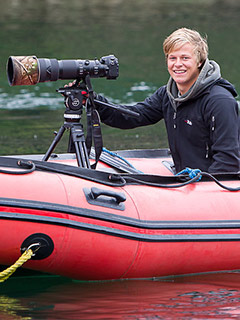Careers
Undergraduate careers
At Bristol you have the opportunity to plan much of your degree programme. A modular course structure permits a good deal of flexibility. Your choice of programme may lead towards certain careers; but sensibly many students do not choose possible careers until they have sampled the range of subjects.
Employers of some of our recent graduates tell us that they see our broad approach in both choice and content of units as leading to a more adaptable (and employable) graduate than do some more specialized and narrowly focused biological disciplines.
The University Careers Service provides information on the destinations of Bristol Biology graduates:
About one quarter of our graduates go on to do postgraduate work for doctorates, while a further quarter or more enter biologically related jobs either directly or after a short period of further training.
Some 10% of our graduates, after further professional training, enter teaching where they are well prepared to deal with the increasing developments in curriculum and methods of teaching.
For those who do not choose employment directly involving biology we see our approach to training as leading to adaptable and broadly educated graduates suited to the widest range of careers.
These areas require high levels of literacy and numeracy and the ability to analyse and solve diverse and complex problems; for this, study in the School of Biological Sciences provides an ideal introduction.
Postgraduate careers
Many postgraduate students choose a higher degree primarily because they enjoy their subject and subsequently go on to work in a related area. An OST (Office of Science and Technology) survey found that around three quarters of BBSRC and NERC funded postgraduates went on to a first job related to their study subject.
Postgraduate study is often a requirement for becoming a researcher, scientist, academic journal editor and for work in some public bodies or private companies. Around 60 per cent of biological sciences doctoral graduates continue in research. Academic research tends to be contract based and there are few permanent posts, but the school has a strong track record in supporting the careers of young researchers, by helping them to find post-doctoral research positions or develop Fellowship applications.
In other careers, a PhD or MSc may be useful in helping your application stand out from the competition. Postgraduate students develop a wide range of transferable skills that are desirable in many jobs and include; problem-solving, self-motivation, independence, working to deadlines, producing reports and communication skills.
Further information:
- FindAPhD.com: PhDs explained and FAQs
- Destinations of University of Bristol postgraduates
- Postgraduate Careers Information and Advice: Vitae
- What careers do researchers do?
Highly rated graduates
We keep in touch with as many of our graduates as possible and are proud that they have embarked on a wide range of interesting and rewarding career paths.

Aspiring wildlife photographer
A 2014 graduate from the school is now a professional wildlife photographer, film-maker and presenter, having spent his spare time as a student making his own wildlife film.
